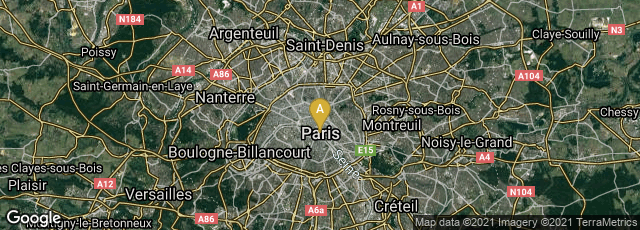

A: Paris, Île-de-France, France
In 1755 French writer and philosopher Denis Diderot published in the Encyclopédie ou dictionnaire des sciences, des arts et des métiers, par une société‚ de gens de lettres an article entitled Encyclopédie. In that he explained that a primary reason for undertaking this enormous writing and publishing project was to manage information overload by providing a rational and comprehensible order to what was already an almost impossibly large and disorganized body of information.
I formerly prefaced my remarks About the Database with a brief quotation from Diderot's article. Equally relevant is this somewhat longer quotation, which places Diderot's partially self-deprecating thoughts in better context:
"As long as the centuries continue to unfold, the number of books will grow continually, and one can predict that a time will come when it will be almost as difficult to learn anything from books as from the direct study of the whole universe. It will be almost as convenient to search for some bit of truth concealed in nature as it will be to find it hidden away in an immense multitude of bound volumes. When that time comes, a project, until then neglected because the need for it was not felt, will have to be undertaken.
"If you will reflect on the state of literary production in those ages before the introduction of printing, you will form a mental picture of a small number of gifted men who are occupied with composing manuscripts and a very numerous body of workmen who are busy transcribing them. If you look ahead to a future age, and consider the state of literature after the printing press, which never rests, has filled huge buildings with books, you will find again a twofold division of labor. Some will not do very much reading, but will instead devote themselves to investigations which will be new, or which they will believe to be new (for if we are even now ignorant of a part of what is contained in so many volumes published in all sorts of languages, they will know still less of what is contained in those same books, augmented as they will be by a hundred—a thousand—times as many more). The others, day laborers incapable of producing anything of their own, will be busy night and day leafing through these books, taking out of them fragments they consider worthy of being collected and preserved. Has not this prediction already begun to be fulfilled? And are not several of our literary men already engaged in reducing all big books to little ones, among which there are still to be found many that are superfluous. Let us assume that their extracts have been competently made, and that these have been arranged in alphabetical order and published in an orderly series of volumes by men of intelligence—you have an encyclopedia!
"Thus we have now undertaken, in the interests of learning and for the sake of the human race, a task to which our grandsons would have had to devote themselves; but we have done so under more favorable circumstances, before a superabundance of books should have accumulated to make its execution extremely laborious" (translation in Baker, ed., The Old Regime and the French Revolution [1987] 85-86).
Diderot also believed that an encyclopedia should be a directory of associations where connections between different areas of knowledge could be exposed and pursued by individual readers in a way analogous to hypertext. In the same article he wrote:
"Every science overlaps with others: they are two continuous branches off a single trunk. He who composes an opus does not enter abruptly into his subject, does not close himself strictly within it, does not leave it abruptly: he is obliged to anticipate terrain adjoining his; its consequences often take him onto another contiguous terrain on the opposite side; and how many other excursions are necessary in the body of the work? What is the purpose of the forewords, introductions, prefaces, exordia, episodes, digressions, and conclusions? If we separated scrupulously from a book what is outside the subject it treats, we would almost always reduce it to a quarter of its volume. What does the encyclopedic linkage do? Just that harsh division. It sets the limits of a subject so firmly that there remains in an article only what is essential. A single new idea generates volumes under the pen of a writer; those volumes reduce to a few lines under the pen of an encyclopedist. We are subjected unawares to what is strictest and most precise in the geometricians' method. We progress rapidly. One page always presents something different from the preceding or subsequent page. The need of a proposition, a fact, an aphorism, a phenomenon, a system, requires no more than a single citation in an encyclopedia , just as in geometry. The geometrician refers from one theorem or problem to another, and the encyclopedist from one article to another. And so it is that two types of opus, which seem so very different in nature, come by the same means to create a most dense, tightly knit, and continuous whole. What I say is so precisely true that the method by which mathematics is treated in our dictionary is the same followed for other topics. From this point of view there is no difference between an article on algebra and an article on theology.
"Thanks to encyclopedic ordering, the universality of knowledge, and the frequency of references, the connections grow, the links go out in all directions, the demonstrative power is increased, the word list is complemented, fields of knowledge are drawn closer together and strengthened; we perceive either the continuity or the gaps in our system, its weak sides, its strong points, and at a glance on which objects it is important to work for one's own glory, or for the greater utility to humankind. If our dictionary is good, how many still better works it will produce" (http://quod.lib.umich.edu/cgi/t/text/text-idx?c=did;view=text;rgn=main;idno=did2222.0000.004, accessed 01-05-2013).